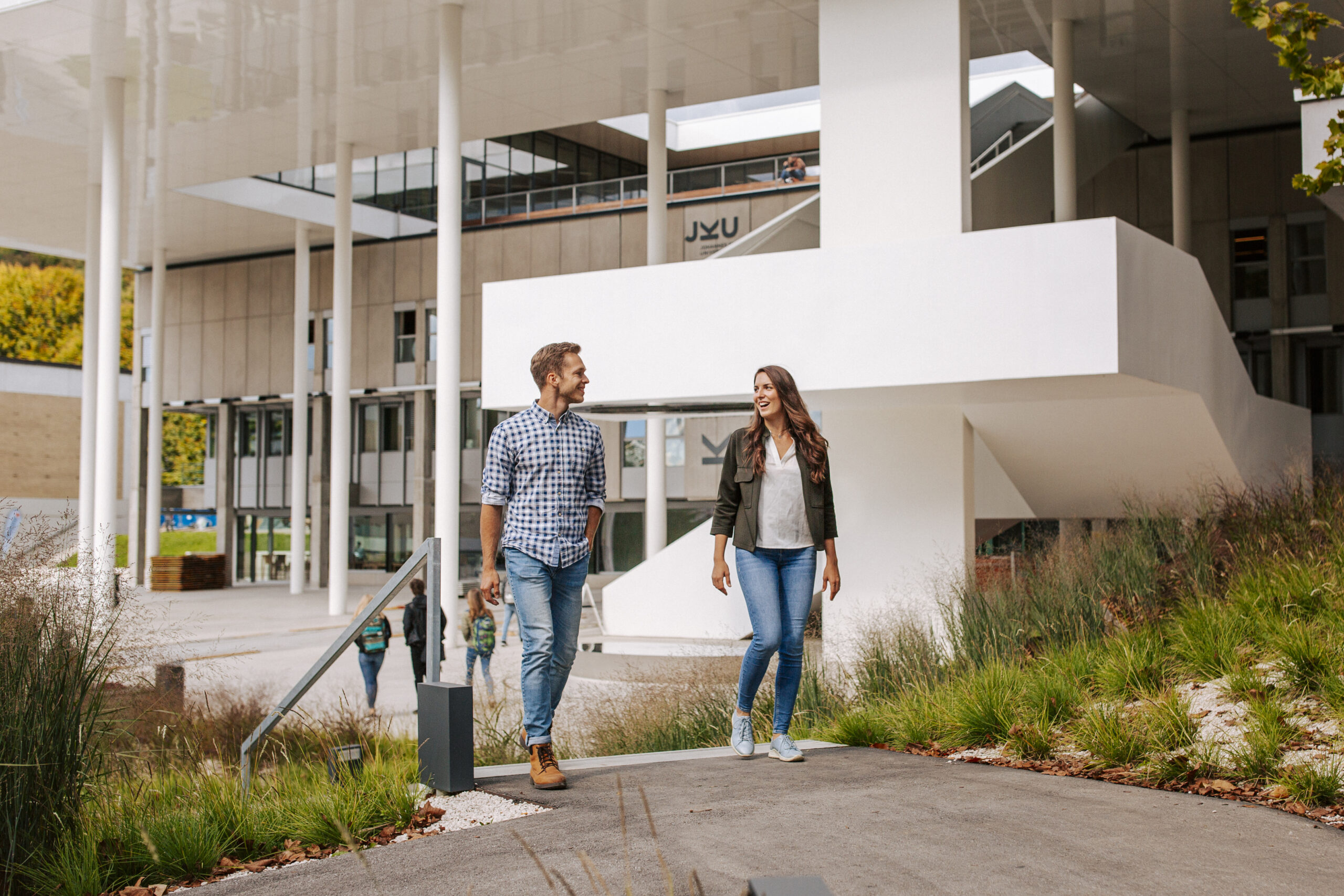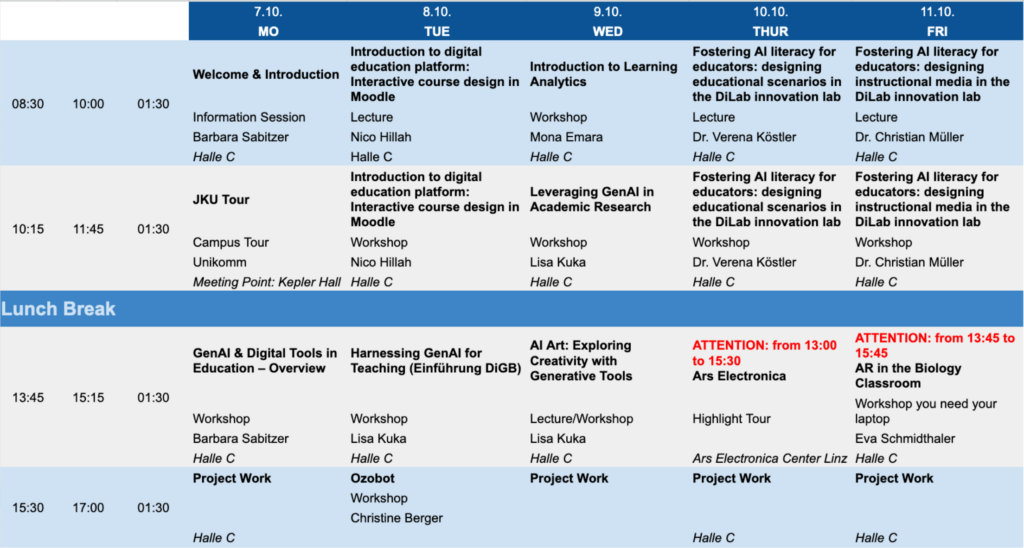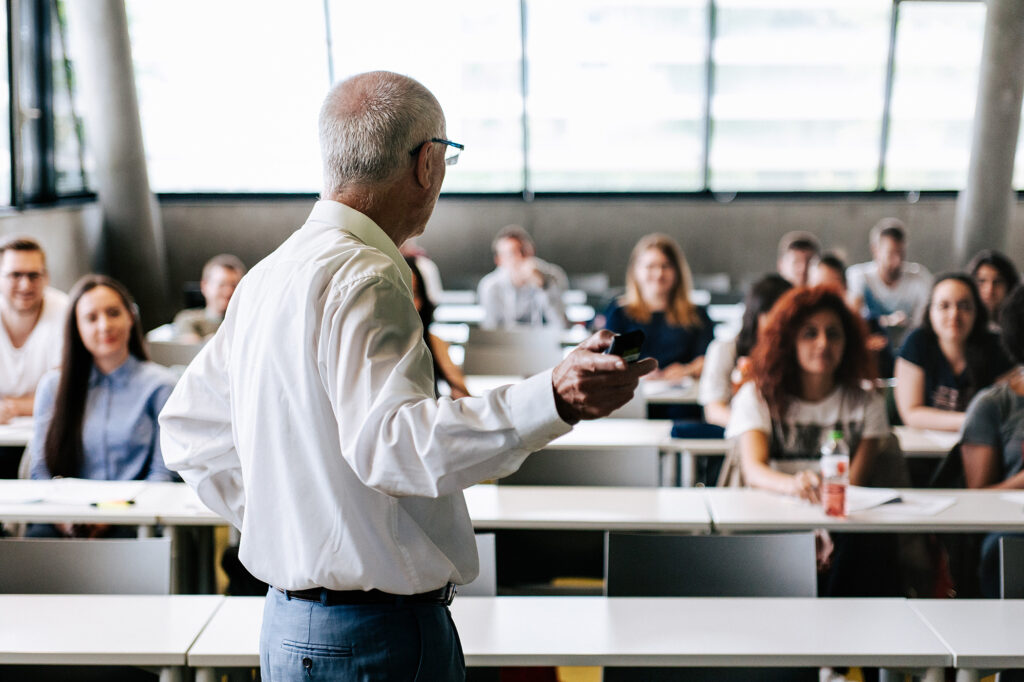Join us for the Erasmus+ Blended-Intensive Program on „Special Topics: GenAI and Digital Tools in Educational Context.“ This immersive program offers a unique opportunity to delve into the cutting-edge intersection of artificial intelligence (AI) and education. Enhance your teaching and learning practices through innovation and collaboration.
When? 7th-11th October 2024
Where? Johannes Kepler University | Altenberger Straße 69, 4040 Linz
Registration: TBA
More details here.

Why participate?
- Cutting-Edge Knowledge: Learn from experts in GenAI and digital tools.
- Hands-On Experience: Engage in interactive workshops and practical sessions.
- International Collaboration: Connect with students and educators from around the world.
- Professional Development: Gain valuable skills and knowledge applicable to your academic and professional career.
Who can participate?
Audience of the BIP Event:
We welcome students from Bachelor, Master, and PhD programs, particularly those focusing on teacher training. Additionally, individuals from diverse backgrounds such as Psychology, Pedagogy, Computer Science, and others who are interested in learning supported by AI and digital tools are also encouraged to attend.
Schedule & Program Highlights
| 6th Oct | Arrival at accommodation |
| 7th Oct | Introduction session Campus tour |
| 8th – 11th Oct | Lectures and workshops Visit to Ars Electronica Center |
| 12th Oct | Departure and travel home |
| During Semester | Participants will work on a designated task related to the program’s topics |
| in Jan | Final online session Presentation of the completed task Discussion on how the learned concepts were applied during the semester |



Immerse yourself in a diverse array of lectures and workshops designed to explore the transformative potential of GenAI and digital tools in education. Our program offers hands-on experiences and expert insights, providing you with the knowledge and skills to innovate in your educational practices. Here are some of the key sessions you can look forward to.
This is not an exhaustive list of the lectures and workshops that will be offered. There will be many more engaging and informative sessions throughout the program, covering a wide range of topics related to GenAI and digital tools in education. Stay tuned for further details and updates!
Lectures
Ethics and AI: Navigating Moral Dilemmas in Technology
Explore critical ethical issues such as the Trolley Problem in autonomous cars, biases in AI systems, and the phenomenon of AI hallucinations. Understand the implications of these challenges and how they shape the development and deployment of AI technologies.
An Introduction to Learning Analytics
Gain insights into the field of learning analytics and its applications in education. Learn from the experiences of Mona Emara as she shares practical examples and outcomes of using learning analytics to enhance educational practices.
The Future of Academic Writing: Innovations and Implications for Pre-Scientific and Bachelor Levels
Based on the paper „Innovation or Imitation? A Critical Analysis of AI-Authored vs. Human-Authored Scientific Papers,“ this lecture examines the use of AI in academic writing. Analyze the benefits and limitations of AI-generated content and its impact on the future of scholarly publishing.
Workshops
Exploring Ozobots, Makey Makey, and MicroBit in the Classroom
Discover how to engage students in hands-on learning experiences with Ozobots, Makey Makey or Microbit. This workshop will teach you the basics of programming these tools and creating interactive projects that foster creativity and problem-solving skills.
Harnessing GenAI for Teaching
Learn how to use AI tools such as ChatGPT and Canva to streamline lesson planning and material creation. This workshop will demonstrate how AI can save time, inspire creativity, and personalize learning experiences for your students.
Leveraging GenAI in Academic Research
Get practical experience with AI tools like Elicit, SciSpace, Research Rabbit, and ChatPDF. Learn how to integrate these tools into your research workflow to enhance efficiency and productivity, making your academic research more effective.
AI Art: Exploring Creativity with Generative Tools
Delve into the world of AI-generated art with an overview of popular tools like Midjourney, DALL-E, and Stable Diffusion. Participate in hands-on sessions with Ideogram, Bing Image Creator, and Canva to unleash your creativity and produce stunning visuals.
Visit to Ars Electronica Center
Experience the cutting edge of art, technology, and innovation with a visit to the Ars Electronica Center in Linz, Austria. Known as the „Museum of the Future,“ this renowned institution offers a fascinating exploration of the intersection between science and society.
Activities:
- Interactive Exhibits Tour: Engage with hands-on displays and interactive experiments that illustrate the latest advancements in science and technology. Discover how these innovations impact our daily lives and the future.
- Deep Space 8K Experience: Immerse yourself in breathtaking audiovisual presentations in the Deep Space 8K, where ultra-high-definition projections create stunning visualizations and educational content.
This trip offers a unique opportunity to witness firsthand the dynamic fusion of art and technology, providing inspiration and knowledge that will complement your participation in the Blended-Intensive Program on „Special Topics: GenAI and Digital Tools in Educational Context.“
https://ars.electronica.art/center/de/
Costs & Funding
A First Draft of Estimated Costs
The JKU is located in Linz, just a 2-hour train ride from the Vienna International Airport. Here is a breakdown of estimated costs:
- Flight: Costs vary depending on the country of origin (between 100-400 EUR round trip)
- Train: Approx. 84,00 EUR round trip (42,00 EUR one-way)
- Linz Tram: 2,80 EUR one-way (needed from Linz train station to JKU)
weekly ticket: 18,00 EUR - Accommodation: Approx. 66,00 EUR per night single room
98,00 EUR per night double room
6 nights – Sunday (6.10.) to Saturday (12.10.) near JKU - Additional individual costs for food
Funding
Funding is provided by the respective home university. For students, the grant is 79,00 EUR per day, with travel costs varying depending on the funding project and national regulations. Each participant should inquire about specific details from their own International Office.
Every official partner university is eligible for funding. The JKU International Office will facilitate a Mobility Agreement for the Erasmus+ Teaching Mobility program. For further details, please refer to the attached short Erasmus+ information document.
The sending HEIs support the physical stay of students and teachers from their Erasmus+ funds:
- Students: Funding as Erasmus+ Short-Term Study Period (79,- EUR per day of stay if duration is 5-14 days).
- Teachers: Funding as Erasmus+ Teaching Mobility


Accommodation
Rooms have been reserved for participants at the Hotel Sommerhaus in walking distance to the JKU campus at the following special rates:
- Single room: 66 € (including breakfast)
- Two bed or double room: 98 € per room (including breakfast)
